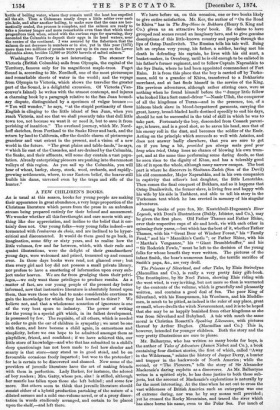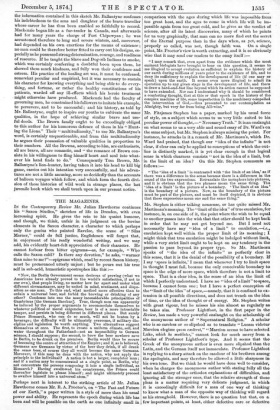A FEW CHILDREN'S BOOKS.
As is usual at this season, books for young people are making their appearance in great abundance, a very large proportion of the Christmas literature which pours from the press in an unbroken stream being prepared entirely for their behoof and amusement. We wonder whether all this forethought and care meets with any- thing like due appreciation, and incline to the belief that it cer- tainly does not. Our young folks—very young folks indeed—are tormented with rembarras du choir, and are inclined to be hyper- critical and discontented. It would do them good to go back, in imagination, some fifty or sixty years, and to realise how the little volumes, few and far between, which, with their rude and quaint illustrations, were the delight of their grandmothers' young days, were welcomed and prized, treasured up and conned over. In those days books were read, not glanced over ; but then every girl and boy did not possess a mall private library, mor profess to have a smattering of information upon every sub- ject under heaven. We are far from grudging them their privi- leges,—we only want those privileges to produce results. As a
• matter of fact, are our young people of the present day better informed, now that instructive literature is absolutely forced upon them, than were those who had to make considerable exertions to gain the knowledge for which they had learned to thirst? We believe not, and that a wholesome sensation of ignorance is one of the very best spurs to industry. The power of writing for the young is a special gift which, in its fullest development, is possessed by few. The requisite, of all others, which is needed in order to gain the ear of children is sympathy ; we must be one with them, and have become a child again, in earnestness and simplicity, before we can hope to be admitted amongst them as playfellow, friend, and confidant ; if we have achieved this, our little store of knowledge—and who that has submitted to a child's -deep questionings has not been made to feel how slender and scanty is that store—may stand us in good stead, and be on favourable occasions freely imparted ; but woe to the pretender! for he is certain to be discovered and shamed. Now some of the providers of juvenile literature have the art of making friends with them in perfection. Lady Barker, for instance, the adored .of boy readers ; Mrs. Gatty, whose pen, alas ! is stilled, although her mantle has fallen upon those she left behind ; and some few more. But others seem to think that juvenile literature should consist either of a hybrid production partaking of the nature of a diluted sermon and a mild one-volume novel, or of a prosy disser- tation in words studiously arranged, and certain to be placed upon the shelf,—and left there. '
We have before us, on this occasion, one or two books likely to give entire satisfaction. Mr. Ker, the author of "On the Road to Khiva " has in The Boy-Slave in Bukhara (Henry S. King and Co.) given us an attractive boys' book. He claims to have grouped real scenes round an imaginary hero, and to give genuine descriptions of this little-known country and people through the lips of Ostap Danilevitch. The Russian tells his tale well. Being left an orphan very young, his father, a soldier, having met his death in defending his captain, he lives with his old aunt, a basket-maker, in Orenburg, until he is old enough to be enlisted in his father's former regiment, and to follow Captain Naprashkin to the Syr Dania, where he had been appointed commandant of Fort Raim. it is from this place that the boy is carried off by Turko- mans, sold to a grandee of Khiva, transferred to a Bokhariote merchant, and at last finds himself in the service of the King. His previous adventures, although rather stirring ones, were as nothing when he found himself before the "dumpy little fellow who looked like a Sart camel-driver "—Nassir Ullah, the conqueror of all the kingdoms of 'Turan—and in the presence, too, of a hideous black slave in blood-bespattered garments, carrying the great, heavy, broad-bladed knife destined speedily to end his days, should he not be successful in the trial of skill in which he was to take part. Fortunately the boy, descended from Cossack parent- age, is brave, and is a good shot, so he saves his head, sees that of his enemy roll in the dust, and becomes the soldier of the Emir. Acting on the principle which succeeds so well with Asiatics, and does not answer badly elsewhere, that you are sure to get on if you brag a bit, provided you always make good your brag when tried, Ostap loses no chance of blowing his own trum- pet, and at the same time performing some daring deeds, so that he soon rises to the dignity of Khan, and has a tolerably good life of it upon the whole, although many narrow escapes. The best part is where he discovers in Shaitaun-Zadeh (Son of the Devil) his old commander, Major Naprashkin, and in his own companion in captivity that officer's lost daughter, the little Lenotchka. Then comes the final conquest of Bokhara, and so it happens that Ostap Da.nilewitch, the former slave, is living free and happy with his wife by his side in Tashkent, and able to tell his story in the Turkoman tent which he has erected in memory of his singular adventures.
Among books of pure fun, Mr. Knatchbull-Hugessen's River Legends, with Dore's illustrations (Daldy, Isbister, and Co.), may be given the first place. Old Father Thames and Father Rhine, over their respective cups of ale and hock, vie with each other in spinning their yarns,—but which has the best of it, whether Father Thames, with his "Great Boar of Windsor Forest," his "Family Feud," and his " MaTTlikin'S Castle "; or Father Rhine, with his "Martha's Vengeance," his "Giant Bramblebuffer," and his "Sir Roderick Fowle," must be left to the decision of the young folks for whose benefit they were written. The pictures of the infant Smith, the boar's numerous family, the terrific sacrifice of Smith's papa, &c., are very droll.
The Princess of Silverland, and other Tales, by Elsie Staivelyne (Macmillan and Co.), is really a very pretty fairy gift-book. The frontispiece, by Sir Noel Paton, showing Elsie riding with the west wind, is very inviting, but not more so than is warranted by the contents of the volume, which is gracefully and pleasantly written, and contains a good deal of fun. The poor King of Silverland, with his Rumpusmen, his Wordmen, and his Muddle- men, is much to be pitied, as indeed is the ruler of anyplace, great or small, where dwells the witch Nevercontent, and it is to be hoped that she may be as happily banished from other kingdoms as she was from Silverland and Rubyland. A tale with much the same moral is Christina Rossetti's Speaking Likenesses, with pictures thereof by Arthur Hughes. (Macmillan and Co.) This is, however, intended for younger children. Both the story and the very pretty illustrations are sure to please.
Mr. Ballantyne, who has written so many books for boys, is the author of Tales of Adventure (James Nisbet and Co.), a book containing four distinct stories, the first of which, called "Away in the Wilderness," relates the history of Jasper Derry, a hunter and trapper in the backwoods of North America ; while the second, or "The Pioneers," tells the story of Sir Alexander Mackenzie's daring exploits as a discoverer. As Mr. Ballantyne writes in a spirited style, he has done justice to both these sub- jects, but the account of Mackenzie's explorations is naturally by far the most interesting. At the time when he set out to cross the vast wilderness of British America such an enterprise was one of extreme daring, nor was he by any means well provided ; yet he crossed the Rocky Mountains, and traced the river which has since borne his name, even to the Polar Sea. For much of the information contained in this sketch Mr. Ballantyne confesses his indebtedness to the sons and daughter of the brave traveller whose career he has thus been enabled so faithfully to record. Mackenzie began life as a fur-trader in Canada, and afterwards had for many years the charge of Fort Chipewyan ; he was accustomed therefore to long and severe winters, and, moreover, had depended on his own exertions for the means of existence ; no man could be therefore better fitted to carry out his designs, es- pecially as he possessed strong determination, courage, and readiness of resource. If he taught the Slave and Dog-rib Indians to smoke, which was certainly conferring a doubtful boon upon them, he showed them much kindness, and fully won their confidence and esteem. His practice of the healing art was, it must be confessed, somewhat peculiar and empirical, but it was necessary to sustain his character for knowing everything and being able to do every- thing, and fortune, or rather the healthy constitutions of his patients, warded off any ill-effects which his heroic treatment • might otherwise have produced. Mackenzie had the faculty of governing men, he constrained his followers to imitate his example, to persevere, and to be successful ; and his history, as told by Mr. Ballantyne, ought to inspire our youths to cultivate the same qualities, in the hope of achieving similar brave and use- ful deeds. The Brown family ought to be exceedingly obliged to this author for his humorous defence of them in his "Hunt- ing the Lions." Their " multitudinosity," to use Mr. Ballantyne's word, is certainly unquestionable, and from this multitudinosity he argues their possession of valuable qualities in proportion to their numbers. All the Browns, according to him, are enthusiasts, all are brave, all are romantic, and "the romance of Brown con- sists in his willingness to fling himself heart and soul into what- ever his hand finds to do." Consequently Tom Brown, Mr. Ballantyne's lion-hunter, having taken it into his head to kill big game, carries out his intention very successfully, and his adven- tures are not a little amusing, more so decidedly than the accounts of balloon voyages which follow, and which form the fourth divi- sion of these histories of wild work in strange places, the last juvenile book which we shall touch upon in our present notice. `



































 Previous page
Previous page